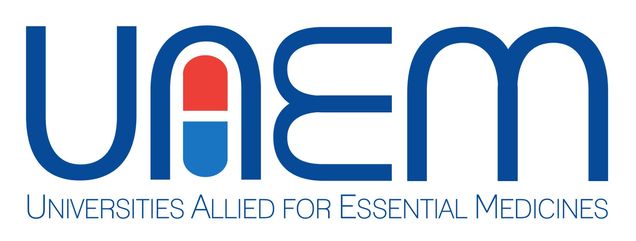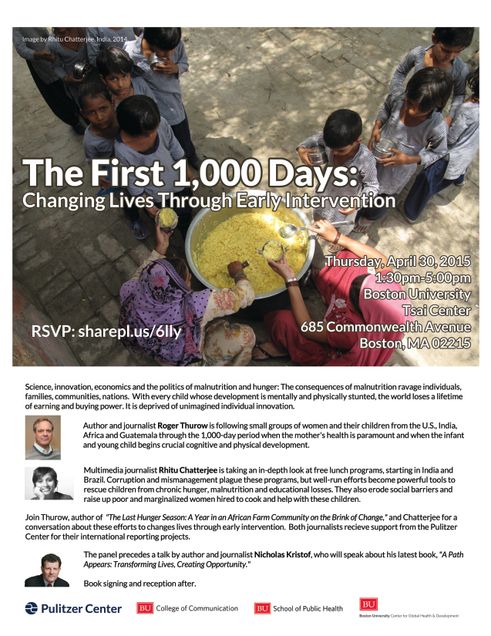Category: GH Announcements
SAVE THE DATE: BU Students Pitch the Idea that Got Them to Google!
Ebola Hackathon – Inspired Team to Pitch Live at Google Wearables Challenge
Three BU SPH students Jessica Autrey, Shauna Biggs, and Kerlyne Jean – also known at Team Proxome – will be pitching their award winning idea, at BU, next Wednesday evening. The team met at the MIT Stop Ebola Hackathon and won first prize for their proposal of a hi-tech/low-cost sensor that monitors the heart rate and temperature Ebola patients.
Since winning the hackathon, they have been working with MGH Center for Global Health, CAMTech, International Medical Corps, and Medtronic to develop our product and get it into the field. In February they entered Proxome into the Boston University Global Health and Engineering Meet-Up Competition where we won first place in the “shark tank” pitch session and third place in the poster competition. On Thursday, April 23rd they are pitching their idea at the Google Wearables Challenge, and hope for another win!
Team Proxome also includes Adrian Gropper, MD, CTO of Patient Privacy Rights; Sean Doyle, a software engineer at MGH; Jim Wright, an electrical engineer with a background in developing wearable devices for military and medical applications.
UAEM University Report Card Ranks Boston University #6 in Global Equity and Biomedical Research
Global Equity and Biomedical Research
This year at the Consortium of Universities for Global Health Conference, Atul Gawande, world renowned surgeon, writer and public health researcher, made the following statement during his opening remarks:
“There are more than 60,000 known ways the bodies’ 13 organ systems can go wrong with over 4000 medical procedures and 6000 medicines found in the last 100 years to treat and prevent those failures. What is Global Health? It is taking this knowledge gained and distributing it to people all over the world.”
Universities are positioned as institutions devoted to the research and discovery of innovations for the benefit of the public that supports them. Many are nonprofit, public-interest institutions heavily funded by government grants and taxpayer-funded sources. They have a duty to ensure that the research they conduct and the treatments they help discover serve the public interest and the global good. As the new generation of global health leaders, today’s students and medical researchers have the ability to support and also pressure these institutions to fulfill their commitment to the ever-growing 8 billion of this world’s inhabitants.
Far too often many medicines are made only available to those who can afford them, regardless of need or the benefit they were created to provide. The tragic result is that millions of people, mostly in the developing world, die each year simply because they don’t have access to medicines that already exist.
On Tuesday, April 21st 2015, Universities Allied for Essential Medicines launched their second University Report Card not only to hold leading global health institutions accountable to their commitments , but also to present where gaps might lie in the areas of Global Access to new innovations, Innovation and research into neglected diseases and Empowerment of the next generation of global health professionals.
In 2013, Boston University received a disappointing C- on the report card, ranking 35th out of 54 schools surveyed, just above The University of Massachusetts in 36th, but well below our neighbors across the river ranking in 5th. With a Business School and School of Public Health that were both just ranked 10th in the world according to Business Insider and US News, a UAEM ranking of 35th in global health impact reflects either a need for university improvement or better measurement indicators.
Constructive criticisms were included in a response to the 2013 findings by Boston University faculty through a Lancet article that criticised the fact that:
“...the title of the Editorial as well as the use of the UAEM reporting card are misleading.”
and
“UAEM can focus on a single component of global health but this should be made clear when reported.”
In response to these criticisms, the second version of the University Report Card introduces aspects not present in the original. Metrics for scoring have been modified based on feedback from the first iteration and are included in full on the website (due to launch April 21st). Additionally, this year there are two questions that address university policies surrounding the recent Ebola outbreak in West Africa, a crisis that has highlighted in particular the failed pharmaceutical R&D model.
Another modification was the new name, “University Report Card: Global Health Equity and Biomedical Research,” which better reflects what it is really measuring: University commitments to ensuring that innovative biomedical research performed in university labs will be accessible to all, and the efforts of universities to educate the next generation of global health leaders.
This year’s version has already received an endorsement from Partners in Health co-founder Dr. Paul Farmer:
“The University Report Card helps illuminate the effects of academic biomedical research on the health of the world's poor, and hold universities accountable for the impact, or lack of impact, that their policies have on global health. I am grateful to the students of UAEM for creating the scorecard, and strongly encourage students, faculty, and broader university communities to call on their institutions to enact policies that increase access to lifesaving medicines and medical technologies for those who need them most.”
This year also showed an unprecedented level of collaboration from students and administrators from dozens of universities around the country. The response rate by universities to the surveys increased threefold from that of the first report card. This project is a major step towards increased dialogue between students, administrators, and researchers. It will also measure whether universities have made any direct changes as a result of their previous grades in 2013. There are rumors that university administrations are vying to reach first place!
We at Universities Allied for Essential Medicines believe that our institutions have an opportunity and a responsibility to improve global health through their research activities. If those same aspirations for a better world were applied across the board to all universities, imagine the impact we would make then. The results of this year’s report can be found [Insert Link]. We should take pride in how BU has improved, but open discussions as to where gaps can still be filled. We have the opportunity to showcase the ways other universities can follow our example as an institution that prioritizes Global Health Equity and the impact of Biomedical Research. Let’s together make this potential impact a reality.
Register for a Women in Global Health panel discussion; only a few seats left!
Join global health professors and other experienced women in global health to engage in a formative discussion about the social, political, cultural, and economic factors affecting women’s positions in society and their contributions to global health and innovation.
Only a few slots left!
(priority will be given to those who have not attended previously)
Thursday, April 23rd from 6 to 8:00 p.m. in CT305
Contact Chase Crossno for more information – ccrossno@bu.edu
view flyer here: WGH Poster
Faculty and students from BUSPH have won an award for “Best Article in 2014” from the Organization Development Journal
Global Health Faculty member Malcom Bryant and students Joanna Krause and Amiya Bhatia are being honored by the Organization Development Journal for Best Article, for their paper: Rigor and Burden" Striking the right balance in organizational capacity assessments
This article can be viewed in full-text in the BU library database.
Women in Global Health Panel
Join global health professors and other experienced women in global health to engage in a formative discussion about the social, political, cultural, and economic factors affecting women’s positions in society and their contributions to global health and innovation.
Only 15 spots available per session—first come first serve!
(priority will be given to those who have not attended previously)
Thursday, April 23rd from 6 to 8:00 p.m. in CT305
Contact Chase Crossno for more information – ccrossno@bu.edu
Practicum Photography Showcase
The BUSPH Arts Society is hosting the first Practicum Photography Showcase! We are looking for engaging photos that tell the story of the people and communities from your practicum!
Your photos will be selected to be showcased at the Practicum Finale in Heibert Lounge on Thursday, April 23rd. Open to all SPH students.
For more information and instructions on how to submit your photos, click the following link: https://app.smartsheet.com/b/form?EQBCT=f2d0eefcfaf6408aa1ffaf29727122f1
Congratulations to BU Students on winning the “Innovation Award” at Emory University’s Global Health Case Competition
Last weekend, 140 students convened in Atlanta for Emory University’s Global Health Case Competition. The Challenge: Create a plan to curb violence in the world’s most violent city, Honduras.
Representing Boston University was: Ariel Falconer (SPH); Karen Foo (School of Medicine); Liz Nerad (Questrom School of Business/SPH); Kim Principe (Questrom School of Business); and Tess Timmes (School of Medicine).
Once all 24 teams arrived in Atlanta, they had less than 24 hours to perfect and present their solution to a panel of judges.
In the end, the Boston University team walked away with the Innovation Award, for proposing a three pronged solution targeted at increasing effectiveness of the system, increasing trust and community outreach, and decreasing gun-related homicide rate, in Honduras.
Current MPH student Abhishek Sharma’s paper “Catch Them Young for Health Future” has been published in the Indian Journal of Community Medicine
Congratulations to our current MPH student Abhishek Sharma! Read the published article here: IndianJCommunityMed_2015_40_2_141_153887
ASPPH/CDC Allan Rosenfield Global Health fellow recipients announced – 2 of the 11 chosen are recent MPH graduates of BUSPH!
The two BU recipients for this highly selective one-year fellowship through the CDC's Center for Global Health are Chiara Draghi (GH, 2015), based in Swaziland and Danielle Payne (EPI, 2014), based in Malawi.




